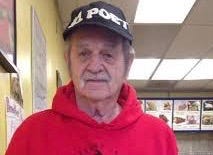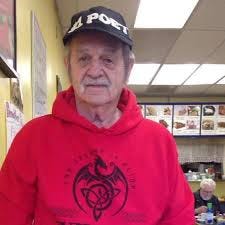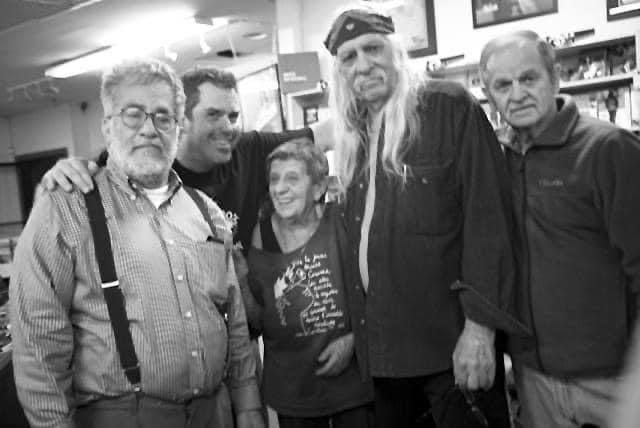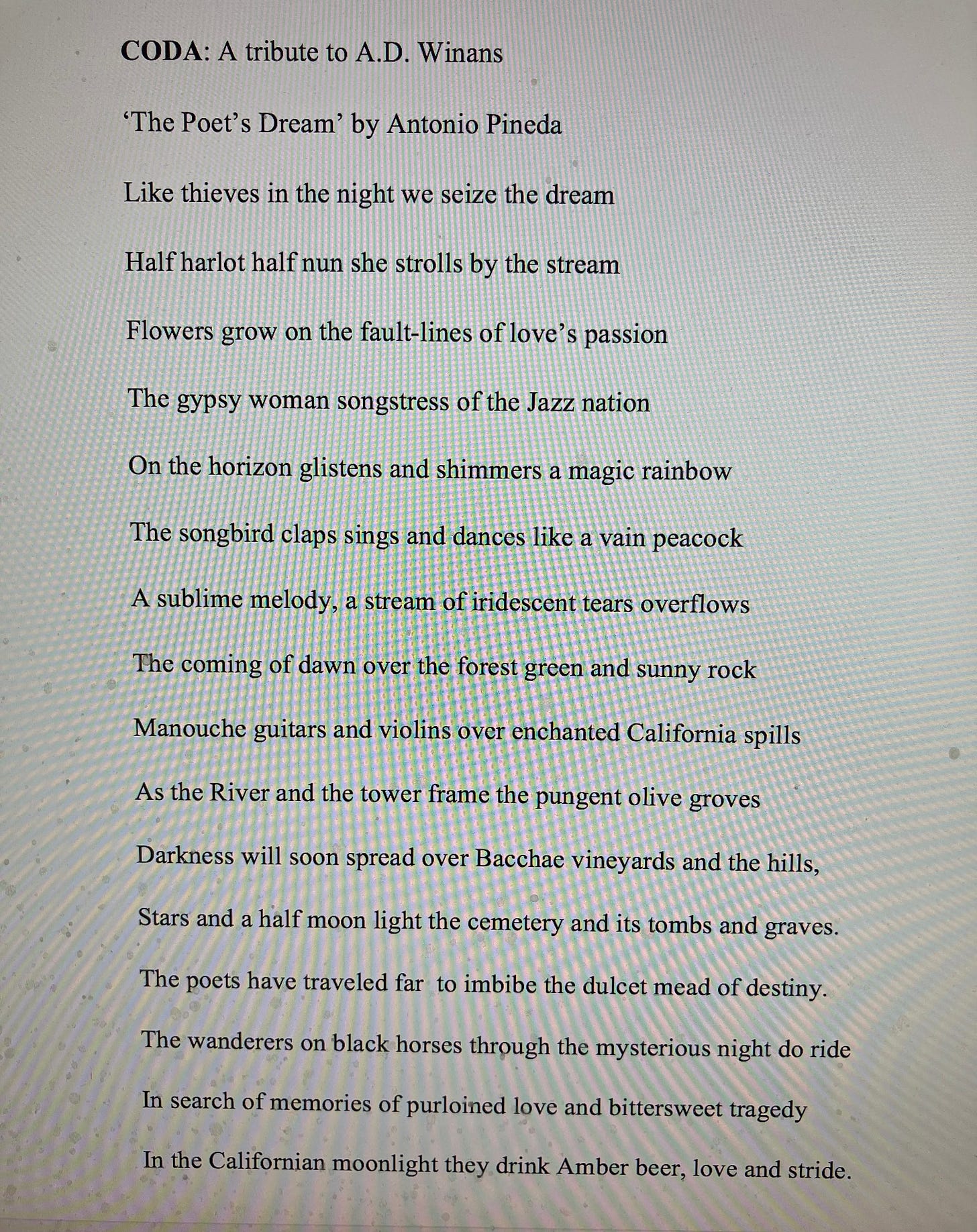Bohemian observer par excellence ANTONIO PINEDA has been clocking the streets of San Francisco for more than 60 years, mixing with the great and the good, the dark and the dangerous, the feckless and the fated, and recovering some of his richest memories for the readers of Rock and the Beat Generation.
Today, after recent forays pursuing past gods of the scene like McClure and Morrison, Kesey and Garcia, Anger and Brautigan, Pineda homes in on a wonderful survivor, the 88-year-old A.D. Winans, poet, editor, publisher, essayist, Bay Area bard, North Beach stalwart, since his return to the city of his birth after military service in 1958.
Winans has rubbed shoulders with so many of the Beats and their accomplices becoming an integrated figure in that charmed circle. Furthermore, he befriended and corresponded with Charles Bukowski, an individual rarely recognised as a fully signed up member of the wider writing community.
As usual, Pineda brings his own spin to the profile – informed, personable, sparky – incorporating a broad cast of players and places – performers and venues, poetry and performances, the muses and the music – peppering this latest account with biographical background and anecdotal sidetrack, conversational fragment and even original verse.
But Pineda positions Winans at the core of this two-part feature, celebrating the veteran’s life and achievement and concluding this opening section with a revealing letter to the poet from Bukowski himself.
By Antonio Pineda
IN A 2012 interview, California-based journalist Michael Limnios states: ‘Writers like Colin Wilson, Studs Terkel, James Purdy, Peter Coyote, Herbert Gold, and the late Jack Micheline and Charles Bukowski have praised [Winans’] work’. As Limnios also points out, he affectionately refers to Bukowski as Buk.
Allan Davis Winans was born on January 12th, 1936, in the city of San Francisco. He attended Polytechnic High School and was an accomplished athlete when local legend Milt Axt was the football coach. His players went on to star in university teams and also professional football.
However, ‘Al’ was not allowed to play football. He’d been hit by a drunk driver and severely injured, hence the ban. However, he did compete as a runner in the 440 in track and field.
Further, Winans was an excellent baseball player who continued this trajectory after Polytechnic when he was in the Air Force stationed in Panama as a military athlete. He is remarkable for being the only native San Francisco graduate of Polytechnic and San Francisco State to be included in the vaunted pantheon of Beat poetry.
Pictured above: Poet and North Beach legend A.D. Winans
Raised in Haight Ashbury and Glen Park, when he came back from military duty in the late 1950s North Beach had become the epicenter of Beat culture and he quickly embraced the bohemian lifestyle.
Winans asserts: ‘When I returned to San Francisco in 1958, I witnessed the plight of the Blacks in the Fillmore, the Latinos in the Mission, and the impoverished and downtrodden in the Tenderloin. It touched me deeply and resulted in the political and social issues in my poetry.’
He muses, ‘I discovered North Beach, where I met Bob Kaufman and Ferlinghetti for the first time. I met Ginsberg and Burroughs at City Lights bookstore but had limited experience with them. Other Beat poets I became friends with were Diane di Prima, Herb Gold, Harold Norse and David Meltzer.’
Kaufman published Golden Sardines in 1967, immortalized by City Lights as edition #21 in the iconic Pocket Poets Series, a format that also published Red cats, those Russian immortals Andre Voznesensky and Yevgeny Yevtushenko. The Russian poets performed a magic reading I attended at the Fillmore Ballroom. Yevtushenko read his epic signature poem ‘Babi Yar’ and Voznesensky performed in the guise of a rock star poet.
Soldier, athlete, poet Winans is a symbol of the golden age in the arts in the City by the Bay. Greenwich Village was the principal focus of bohemia in the Big Apple, but North Beach, with its cosy bars and alleys, was at the core of the West Coast’s radical expression.
That tradition of free spirits dated back to the Barbary Coast, tracing its literary antecedents to the post-Gold Rush genius of Ambrose Bierce, a self-educated, self-made writer whose short stories about the Wild West foreshadowed the progeny of Beat writers who were to descend on San Francisco in the middle of the twentieth century.
Winans is the 49er born here to pan literary gold, mingle with the greatest minds of his generation and, now a survivor of 88 years, one who lives long to tell the tale. A prolific poet of the Beat Generation, his poetry, short stories, essays and reviews have been published in over 500 anthologies.
He is the author of 60 books and chapbooks of poetry and prose, renowned for his love and inspiration for jazz and the San Francisco-North Beach scene that was such a vital backdrop to the evolution of Beat culture. Poet Jack Micheline referred to Winans as ‘a man in search of his soul.’
Winans was awarded a 2006 PEN Josephine Miles award for his contributions to literature. From 1972 to 1989 he published and edited Second Coming Press which specialized in books and anthologies. In 2009 PEN Oakland granted him a Lifetime Achievement award.
My own experiences mirror Winans’ upbringing. I graduated from Mission High School when Carlos Santana was also enrolled there. I became a habitué of North Beach hanging out at Caffe Trieste, the Coffee Gallery, Gino and Carlo, Enrico’s, Vesuvio, and the Anxious Asp that had the best jukebox in town and a mixed crowd of straights, gays and ethnics all dancing to the groovy sounds of the day.
Winans reflects on North Beach: ‘Gino and Carlo was my main bar. Charles McCabe, eclectic San Francisco Chronicle columnist, had his own reserved seat there. Journalist Warren Hinckle was a regular. Poet Jack Spicer drank there. A lot of SF history there.’ The Beat revel, rebel and revolt entwined in convivial harmony.
Some little while ago, Winans, Neeli Cherkovski and Todd Swindell formed a panel celebrating the work of Harold Norse. Ferlinghetti commented of the latter’s work: ‘Harold Norse’s poetry was very much expatriate poetry. It was the voice of alienation from modern consumer culture.’
Beat author and poet Norse chronicled the adventures of Peter Orlovsky, Kerouac and Ginsberg, Corso, Brion Gysin and Burroughs at the Beat Hotel located 9 Rue Git La Coeur in Paris. A seminal venue for Beat bohemians to live and eat on the cheap, write and subsequently publish. William Carlos Williams rated Norse as the best poet of his generation. Norse also penned the experimental cut-up novel Beat Hotel Im 1960.
Winans also reminisces on the jazz scene in the city, that is so influential to his oeuvre. ‘I dug Miles Davis at the Blackhawk in 1963. I had the record of the performance but lost it in a fire at my apartment. I usually take people I liaise with, but are first timers to town, to Vesuvio.’
The subterraneans who populated bohemian North Beach were to reflect his visions of poetry and prose. The inflections of jazz as Miles blows a ‘All Blues’ on his horn, John Coltrane’s Quartet grooved on ‘My Favorite Things’ at the Jazz Workshop on Broadway, and Jimbo’s Bop City in the Fillmore hosted the after hours sessions starring Merle Saunders that continued til dawn. All colored the midnight streets of the city as Winans incorporated these elements into his life and poetry.
Pictured above: A.D. Winans (right) with Neeli Cherkovski, publisher Daniel Yaryan, ruth weiss and Jerry Kamstra, a ‘Sparring with Beatnik Ghosts’ event at the Beat Museum in 2014. Image Christopher Felver, courtesy Daniel Yaryan
I matriculated in bohemia in Haight Ashbury during my tenure at the Straight Theater and connected with Carlos Santana himself who by then was already a leading star on the San Francisco music scene.
Carlos frequently performed at the Straight Theater in the first incarnation of-the band called the Santana Blues Band. This scene also brought me to the attention of Beat poet Michael McClure, Richard Brautigan, Lenore Kandel and filmmaker Kenneth Anger. I participated under the aegis of the theater in the production of poetry readings, film screenings and dramatic performances.
Winans’ poetry spake in tongues. Bukowski was his dear friend and collaborator of San Francisco. Bukowski commented. ‘I have two choices…stay here at the post office and go crazy…or stay out here as a writer and starve. I have decided to starve.’
Bukowski’s literary readings were mythic, featuring the drunk, raucous audience clashing with the angry poet. In his youth, the poet had been mocked as Heine, a slur on his German birth, an unpopular ethnicity during World War II and post-war era.
Barfly, a cinematic evocation of Bukowski under the guise of the character Henry Chinowski, directed by Barbet Schroeder and starring Mickey Rourke as the protagonist and Faye Dunaway as the love interest, was a critical and financial success. Bukowski is acclaimed and popular in Germany. In fact, tourists from the Fatherland flock to Los Angeles in package tours to pay homage to the bars and flop houses he frequented.
Bukowski once reflected: ‘I remember a story about this guy they found in the park. He’d been living in a cave there, coming out at night and living off the picnic scraps. They caught him and took him off. I thought there but for the grace of the typewriter go I. The keys are my solitude, my luck, my picnic scraps. Hate me but buy my books. Read the old philosophers on Solitude. Don’t write me, phone me or write like me. If you ever see me anywhere forget it. It isn’t me.’
In a letter to Al Winans, Bukowski reveals:
Thanks for making me the cover boy on your latest issue. There’s a lot of lively writing in there. Your years were hardly wasted, but I still don’t see how you bear up with the personalities.
Jesus Christ man your handwriting getting worst and worst…so hard to read hope you have not turned into a total drunk. Hope you’re all right. I’m strictly on the wine now and try not to do it every night. I’m dependent on it hard not to write without it. A lot of shit troubles here and I’m trying to straighten them out.
Ok if you’re in town this summer to come by but I hope I don’t have to do the airport trip…you mustn’t think of me as a snob it’s just I’m immersed in my own trivialities.
On the photo you use of me on the cover I don’t know when it was taken. Neeli Chernovski’s old man, Sam took it. I was down on Skid Row a long time ago – 1955 –who knows.
But all in all I hope things are ok with you or getting better.
Sure, Hank
Al Winans adds, ‘We exchanged 83 letters over a 17 year period.’
As philosopher Francis Bacon was wont to say: ‘The job of the artist is always to deepen the mystery.’







Marvelous piece. Wonderful to see Al's story so warmly rendered in print. Loved the bits about Bukowski and of course the colorful descriptions of the cafe's and bars in North Beach. A great contribution to the larger narrative of the people who tie the Beat Generation to the present day.
All these giants of poetry and music is this historic place, someone could do a game board and put all the pieces on different streets. What would be a good name for this? All these personalities are rich but the poem at the end is priceless. Antonio Pineda comes through with such incredible stuff, even Lord Byron would bow reading the very fine tone and beauty of it; it would make an incredible painting or mural somewhere in North Beach.